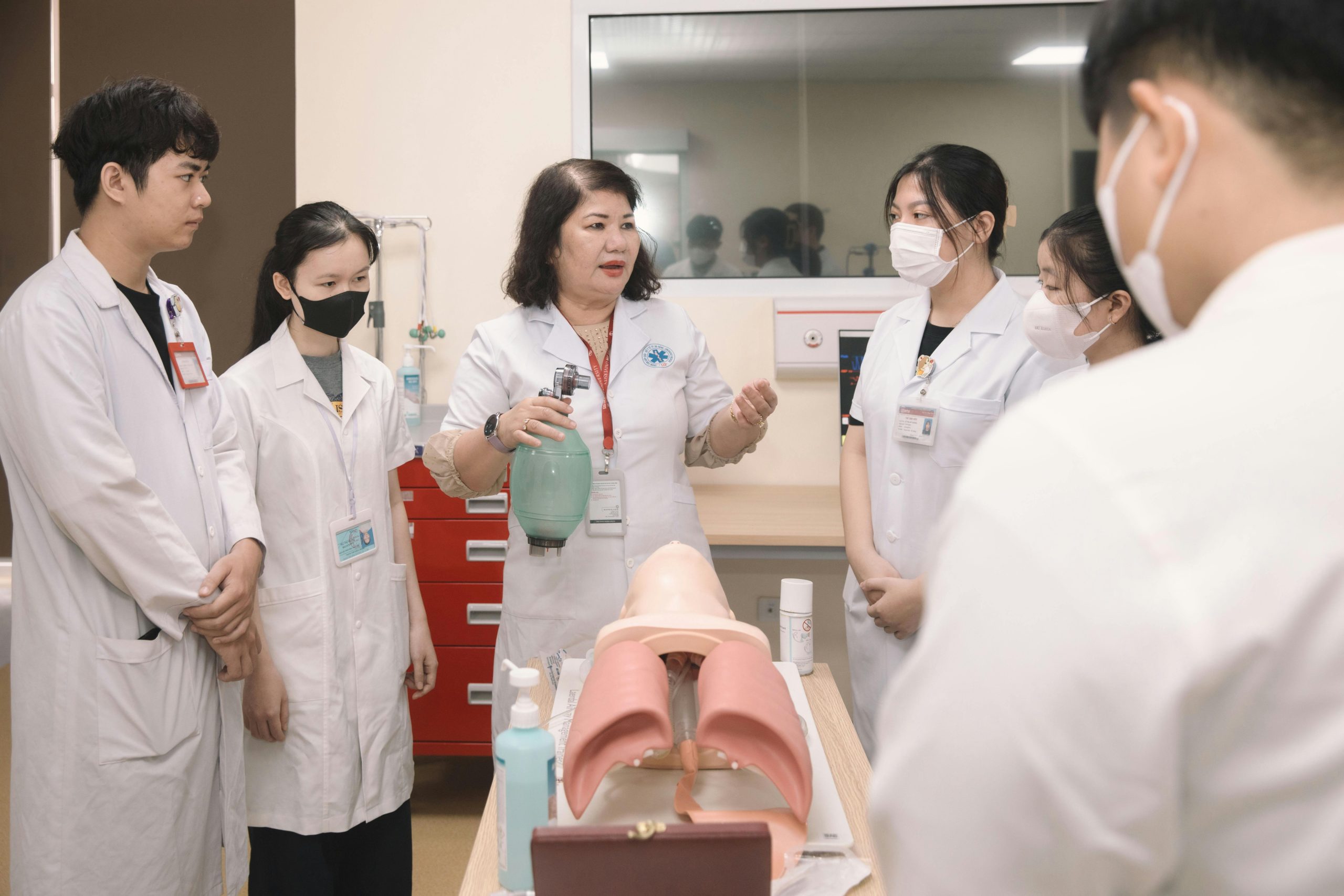English Skills Training for Global Health Success
In today’s interconnected healthcare systems, English skills training has become more than a language course. It is a bridge that connects foreign-educated health professionals with patients, colleagues, and healthcare protocols worldwide. For many professionals arriving in new countries, mastering medical terminology, patient communication, and workplace collaboration is not just a skill but a survival tool that defines career success.
Healthcare is a field where miscommunication can have life-altering consequences. When a nurse or doctor cannot clearly explain a diagnosis or treatment, the patient experience is compromised. English proficiency ensures accurate patient instructions, safe medication practices, and proper reporting of health data. This not only benefits the professional but also improves patient safety and public health outcomes.
English skills training also boosts confidence in professional settings. A healthcare worker who can participate actively in team discussions, contribute to case reviews, and interact with patients naturally is far more effective. The ability to ask questions, clarify doubts, and collaborate with supervisors removes barriers that often isolate foreign-educated staff. This confidence translates into better job satisfaction and a stronger sense of belonging in their new community.
English Skills Training and Workplace Integration
For foreign-educated health professionals, integration into the workplace is a major challenge. Language gaps can lead to isolation, misunderstandings, and reduced efficiency. By undergoing English skills training, professionals can learn industry-specific vocabulary and practice real-life communication scenarios. This includes role-playing patient interviews, writing clinical notes, and learning how to respond to emergencies using the correct terminology.
Workplace integration is not only about speaking English but also understanding cultural norms and communication styles. For example, in some countries, patients expect detailed explanations, while in others brevity is appreciated. Learning how to adapt to these expectations makes healthcare workers more effective and respected within their teams. It also reduces stress, as professionals no longer fear making mistakes that could affect their credibility.
Moreover, integration brings opportunities for career growth. A professional who can express themselves clearly is more likely to receive promotions, be considered for leadership roles, and participate in advanced training programs. English skills training is therefore an investment not just in communication but in long-term career development.
English Skills Training and Social Inclusion
Outside the workplace, English skills training helps professionals build relationships and feel connected to their new communities. They can engage in social activities, communicate with neighbors, and participate in events that make them feel at home. Social inclusion is crucial for mental well-being, especially for professionals who have moved far from their families.
Research has shown that immigrants with strong language skills report lower levels of stress and higher life satisfaction. They are able to navigate public services, enroll their children in schools, and understand legal or financial documents without constant assistance. This independence empowers them to focus on their careers without feeling overwhelmed by daily challenges.
Finally, being socially included creates a support network that can be a lifeline in times of crisis. Colleagues and friends who understand their struggles can provide advice, encouragement, and resources. English skills training thus becomes not just a professional requirement but a path toward a balanced, fulfilling life.
English Skills Training for Patient-Centered Care
The heart of healthcare lies in patient-centered care, and English skills training plays a pivotal role in achieving it. When healthcare professionals can communicate clearly, they can understand patients’ concerns, explain diagnoses accurately, and guide them through treatment options with empathy. This builds trust, which is a cornerstone of effective healthcare delivery.
For example, a patient who feels understood is more likely to follow medical advice, attend follow-up appointments, and adhere to treatment plans. Language proficiency also allows health workers to detect subtle emotional cues that might otherwise be missed. This can make a difference in identifying early symptoms of depression, anxiety, or chronic illness, leading to better health outcomes overall.
Furthermore, English skills training equips professionals with the ability to deliver health education programs in communities. From explaining vaccination benefits to running awareness campaigns about nutrition, they can empower patients to make informed decisions about their health. This educational role enhances the reputation of the professional and builds stronger connections with the community.
English Skills Training for Technology and Innovation
Modern healthcare relies heavily on technology, and English skills training ensures professionals can fully utilize these tools. Whether it is using electronic health records, reading medical research, or participating in online training modules, English proficiency is a key enabler. Without it, professionals may struggle to interpret data correctly or miss out on new opportunities for learning.
Healthcare is an ever-evolving field, with innovations emerging every year. Professionals who are fluent in English can stay updated with global research, attend international conferences, and participate in cross-border collaborations. This continuous learning gives them a competitive edge and keeps their practice aligned with the latest standards of care.
Moreover, telemedicine and digital health platforms are becoming increasingly common. English proficiency allows professionals to interact confidently with patients across borders, ensuring that remote consultations are as effective as in-person visits. This is especially critical in areas with limited access to specialized care, where online services may be the only option.
English Skills Training and Leadership Development
Strong communication skills are essential for leadership, and English skills training is often the first step toward developing these skills. Leaders must be able to inspire teams, negotiate with stakeholders, and present ideas persuasively. For foreign-educated professionals, mastering English opens the door to these opportunities.
When healthcare workers can participate in policy discussions, contribute to quality improvement initiatives, and mentor junior staff, they elevate the entire organization. This creates a culture of collaboration and excellence where everyone benefits. The organization becomes more inclusive, and professionals gain a sense of purpose and recognition.
Finally, leadership opportunities often require written communication, such as drafting reports, submitting proposals, or publishing research. English skills training equips professionals with the ability to express complex ideas clearly and persuasively. This skill not only boosts individual careers but also contributes to better decision-making at the institutional level.
English Skills Training for Professional Networking
Networking is one of the most powerful tools for career growth, and English skills training gives foreign-educated professionals the confidence to connect with peers. Whether attending a medical seminar, participating in a workshop, or joining professional associations, being able to express ideas clearly opens doors to valuable opportunities.
Through networking, professionals can find mentors, exchange knowledge, and discover new career paths. They can also collaborate on research projects, gain exposure to different medical practices, and even secure positions in prestigious hospitals. These opportunities often arise from informal conversations, making language fluency an essential asset.
Additionally, networking strengthens a sense of belonging. Professionals no longer feel isolated but instead become active contributors to the medical community. This sense of inclusion motivates them to strive for excellence and share their expertise with others, creating a cycle of mutual growth and support.
English Skills Training for Compliance and Safety
Healthcare is one of the most regulated industries, and compliance with standards is critical. English skills training helps professionals read and understand complex regulations, safety protocols, and legal requirements. Without this ability, even experienced workers risk making errors that can have legal or ethical consequences.
For example, accurate reporting of incidents, proper documentation of patient data, and adherence to infection control procedures all depend on language precision. Training ensures that professionals do not miss important details that could compromise patient safety or lead to legal disputes.
Moreover, understanding workplace policies promotes a culture of accountability. When staff are confident about what is expected of them, they work more efficiently and maintain higher standards of care. This not only protects patients but also safeguards the professional reputation of the institution.
English Skills Training as a Life-Changing Investment
Perhaps the most powerful impact of English skills training is its ability to transform lives beyond the hospital walls. It empowers professionals to advocate for themselves, pursue higher education, and become role models for others in their communities. The benefits ripple outward, touching not just careers but families and future generations.
Professionals who invest in language training often report higher earnings, greater job stability, and improved quality of life. They are also more likely to contribute to their communities through volunteer work, public health campaigns, and mentorship programs for younger colleagues. This multiplier effect demonstrates that language learning is not just an individual effort but a social contribution.
For more insight into global healthcare workforce development, you can visit this World Health Organization resource, which offers valuable information on training and policies that shape the future of healthcare systems.
Conclusion
In conclusion, English skills training is far more than a linguistic exercise. It is a comprehensive tool for career advancement, workplace integration, patient safety, and personal growth. For foreign-educated health professionals, it removes barriers, builds confidence, and creates opportunities that may have seemed unreachable before.
By embracing language training, professionals invest in a future where they can serve patients better, achieve leadership roles, and thrive in their new environments. This is why initiatives that support English education for healthcare workers deserve recognition and encouragement from the global community.
Discover more inspiring stories about community-focused initiatives in our Public Praise Mauritius section where we highlight positive actions making a difference in society.




